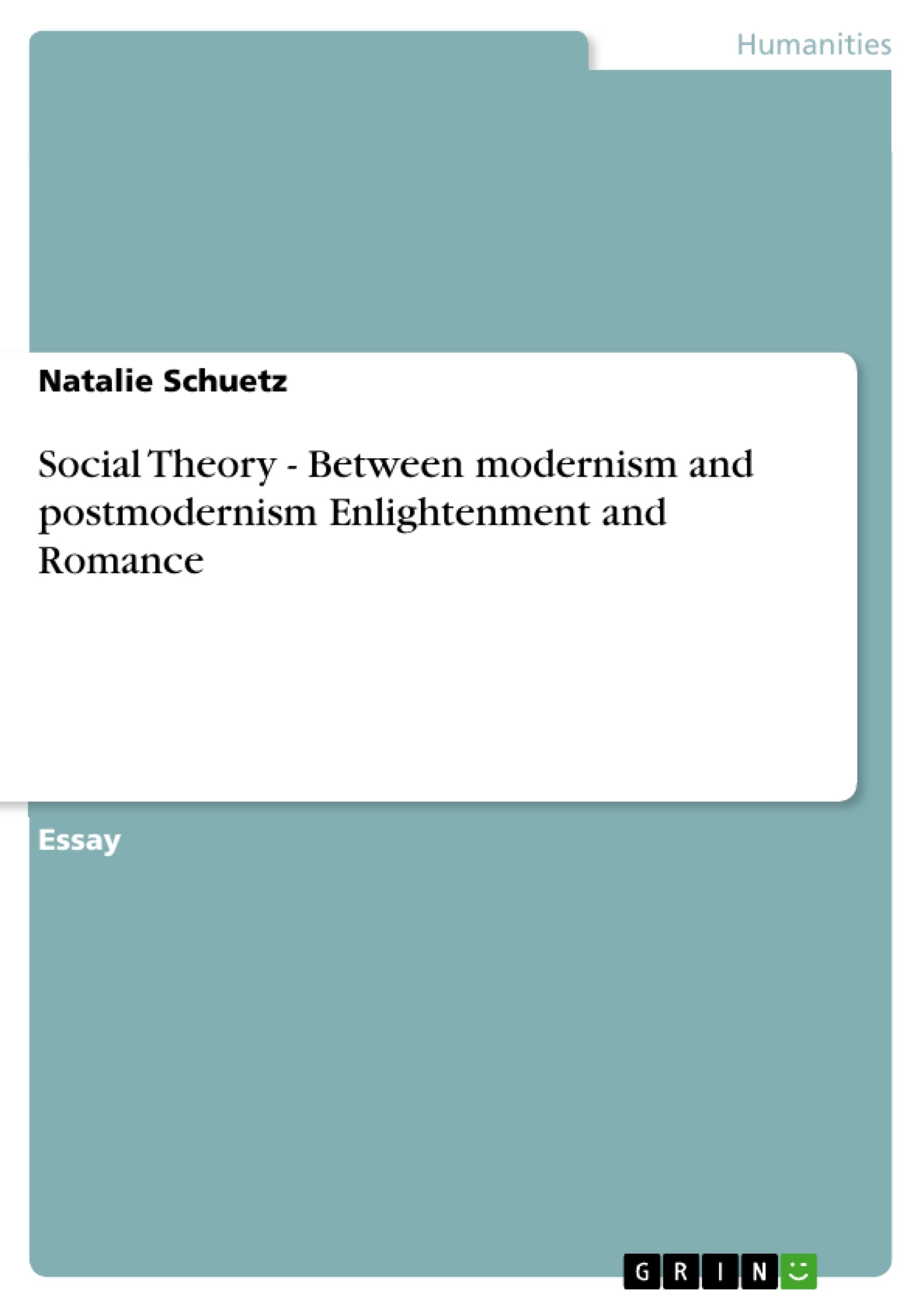The term “postmodern” has become a popular label for something about the life and thought of recent decades in the most developed societies. It both refers to phenomena in the real world, and to an intellectual movement. Representatives of the postmodern movement not only express conflicting views, but are interested in barely overlapping subject matters such as art, history, economics, politics, methodology and literature. What the term “Postmodernism” actually means, has been the subject of a lengthy debate ever since its emergence.
This essay deals with the social theory about seven pages.
Inhaltsverzeichnis (Table of Contents)
- Postmodernism: A Term in Dispute
- The Critique of Modernity
- Modernism and its Critics
- Modernity: A Controversial Civilization
- Postmodernism: A New Approach to Modernity?
- Postmodernism and the Critique of Enlightenment
- The Rise of Pluralism and Representation
- Postmodernism and the Rejection of Hierarchical Dualism
- Gilroy's "The Black Atlantic: Modernity and Double Consciousness"
Zielsetzung und Themenschwerpunkte (Objectives and Key Themes)
This essay explores the complexities of postmodernism as a concept and movement, analyzing its relationship with modernism and its critiques of the Enlightenment. It examines the diverse understandings of postmodernism, its core tenets, and its impact on various fields, including philosophy, literature, and politics. The essay then focuses on Paul Gilroy's work "The Black Atlantic: Modernity and Double Consciousness," which offers a critical perspective on black identity within the context of European modernity.
- The multifaceted nature of postmodernism and its relationship to modernism
- The critique of Enlightenment principles and their impact on modern Western society
- The role of pluralism and representation in postmodern thought
- The concept of double consciousness and its application to black identity in the Black Atlantic
- Gilroy's critique of modernism and his exploration of the transnational nature of African diasporic intellectual culture
Zusammenfassung der Kapitel (Chapter Summaries)
The essay begins by introducing the term "postmodernism" and its contested meanings. It explores how postmodernism is often associated with a rejection of modern Western civilization's fundamental intellectual pillars, and its connection to political movements like multiculturalism and feminism. The essay then examines the relationship between postmodernism and the critique of the Enlightenment, tracing the roots of this critique back to the 18th century. It argues that postmodernism, though not the sole critic of modern thought, represents the latest wave in this critique.
The essay then delves into the concept of "modernity" and its implications. It highlights the contrasting views of modernity, with some seeing it as a force for progress and others as a source of oppression and alienation. The essay then discusses postmodernism's core tenets, including its emphasis on pluralism, representation, and the rejection of hierarchical dualism. It explores how postmodernists challenge the notion of fixed identities and question the validity of traditional knowledge systems.
The essay concludes by examining Gilroy's "The Black Atlantic: Modernity and Double Consciousness," highlighting his exploration of black identity in Europe and North America. It analyzes Gilroy's perspective on the relationship between black experience and the Enlightenment project, focusing on his critique of the idea of universality and the fixity of meaning. The essay also explores Gilroy's concept of the Black Atlantic as a space of transnational cultural construction and his emphasis on the hybridity of black diasporic identities.
Schlüsselwörter (Keywords)
The main keywords and focus topics of this essay include postmodernism, modernism, Enlightenment, critique, pluralism, representation, double consciousness, Black Atlantic, African diasporic culture, hybridity, and transnationalism. These terms encapsulate the key themes and concepts explored throughout the essay, including the ongoing debate surrounding postmodern thought, its relationship to modernism, and its impact on understanding identity and culture.
Frequently Asked Questions
What is the central theme of postmodernism?
Postmodernism is characterized by a critique of Enlightenment principles, an emphasis on pluralism, and the rejection of fixed identities and hierarchical dualisms.
How does postmodernism relate to the Enlightenment?
It represents a wave of critique against the Enlightenment's focus on universal reason and progress, questioning the validity of traditional knowledge systems.
What is Paul Gilroy's "The Black Atlantic"?
It is a seminal work that explores black identity as a transnational cultural construction, challenging fixed notions of identity within European modernity.
What does the term "double consciousness" mean?
The term refers to the internal conflict experienced by subordinated groups in an oppressive society, specifically applied to black identity in Western modernity.
Why is the term "postmodern" often disputed?
The term is contested because it refers to a wide range of overlapping phenomena in art, politics, and philosophy, leading to conflicting views on its actual meaning.
- Citation du texte
- Natalie Schuetz (Auteur), 2008, Social Theory - Between modernism and postmodernism Enlightenment and Romance, Munich, GRIN Verlag, https://www.grin.com/document/117711



